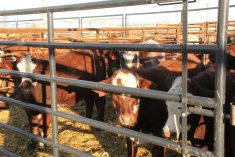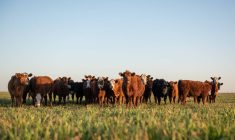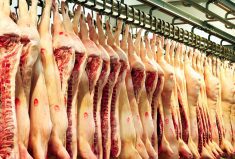One of North America’s largest beef buyers is telling feeders that it wants a little more fat and a little less lean, and is delivering a not-so-subtle hint on their choice of growth promotants to achieve it.
“Maximizing performance and efficiencies pre-harvest at the expense of beef taste and tenderness concerns us — it’s not in the best interest in the long run,” Cargill’s senior beef buyer Steve Molitor told a recent feedlot conference here.
The reference was to the use of beta-agonists, feed additives used to boost growth by diverting growth that would otherwise go into fat into lean meat. That’s an advantage for feedlot operators selling animals by the pound, but not for Cargill, which is looking to sell tender beef with plenty of marbling.
Read Also

The joys of fishing from shore
Manitoba has many lake and river shorelines to drop a fishing line without the cost of a boat, making shore fishing more accessible, and anglers can still catch impressive fish.
Molitor even warned that markets for western beef in Eastern Canada might be at risk because consumers may begin to prefer U.S. product.
“I don’t know that that’s true today, but I hope not, and I don’t want that to ever take place because at the end of the day we want everybody to believe that the product coming out of Canada is just as good of quality or better than anywhere out of the U.S.,” Molitor said.
However, the undercurrent at the meeting was what is widely known in the feedlot industry, but not confirmed by Cargill, which is that it’s OK with one brand of beta-agonist but not the other.
The meeting was sponsored by Certified Angus Beef and Elanco, which manufactures Optaflexx, one of two beta-agonists on the market. The other is Zilmax, manufactured by Merck Animal Health, known as Intervet Canada in this country.
Both beta-agonists are approved for use in Canada and the U.S.
Within the feeding sector, it is well known that Cargill will not buy beef finished with Zilmax, which is said to put on as much as 30 pounds of hot carcass weight, but with a minor decrease in marbling.
Optaflexx also helps cattle put on muscle, but isn’t quite as effective. Some research indicates cattle fed with Optaflexx can put on between 10 and 21 pounds of extra hot carcass weight, but it doesn’t appear to reduce marbling.
“The bottom line is it’s a pretty linear reaction. Growth promotants that have the greatest effect on muscle deposition dilute the fat, so essentially a reduction in marbling is pretty linearly related to how big of a boost we get in gain. And so that Zilmax increases gain greater than Optaflexx does and so not surprisingly, it does reduce marbling,” said independent animal feed expert Darryl Gibb.
Won’t confirm
However, Cargill is reluctant to confirm its refusal of Zilmax-finished animals. Molitor wouldn’t submit to any interviews at or after the conference, and all media requests had to go through Cargill’s official communications office. An email list of questions was submitted for Molitor, and he would not confirm or deny that Cargill is still refusing to buy animals who have been Zilmax finished.
“Our policies toward beta-agonists are determined by our customers and their beef requirements,” he answered via email.
Lee-Anne Walter, performance products account manager for Merck, says she is well aware of Cargill’s position, but maintains there is plenty of room for both beta-agonists in the market.
Sandra Gruber, who spoke at the conference for Elanco, wouldn’t speak about Cargill’s beta-agonist policy, but did say producers need the right to choose between available technologies.
Tight Choice supplies
Cargill’s concerns appear to stem from tight supplies of well-marbled Choice beef for the restaurant trade, made worse by the overall tight supplies of feedlot cattle. At the same time, feedlot operators, squeezed by high feeder prices one on side and high feed grain prices on the other, are looking for maximum efficiencies, especially when there is no assurance of premiums for more marbling.
Molitor suggested the decrease in Choice supplies had been due to growth promotants, but also said the increase in high-quality black cattle has helped compensate.
“That is a big concern for us that at some point, there just will not be enough Choice beef and I think we’ve just been fortunate enough that we’ve improved the herd so much that we really haven’t noticed it up until now,” Molitor said at the conference.
Despite Cargill’s apparent concerns about Zilmax, it is not paying a premium to feeders who agree to use Optaflexx.
Dr. Larry Corah, vice-president of Certified Angus Beef, said it prefers Optaflexx, but either beta-agonist can be used and still fall under the Certified Angus Beef umbrella as long as it grades within their criteria. However, Corah also acknowledged Cargill’s concerns.
“We’re more comfortable with a little less-aggressive growth technology strategy, whether that’s implants or beta-agonists,” Corah said.


















